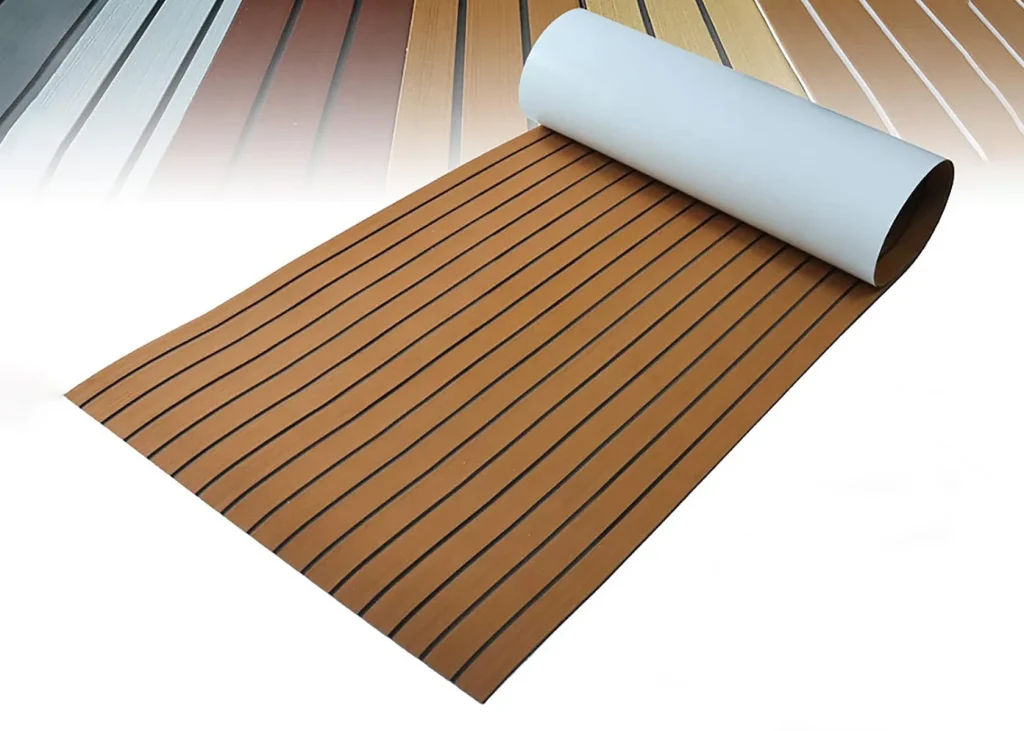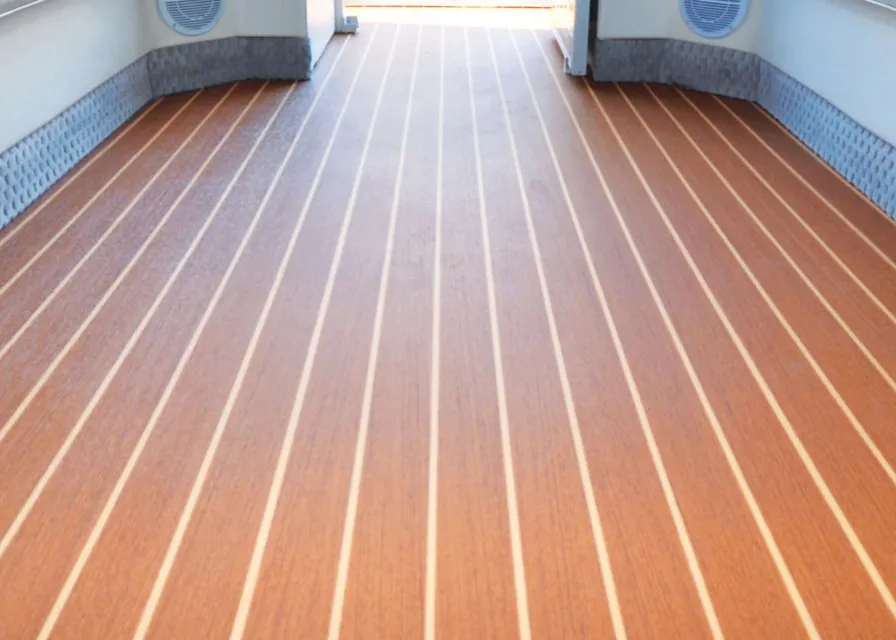Despite regular cleaning and proper maintenance, boat flooring usually needs to be replaced when it is no longer functional to use. Understanding the ideal time and the best materials for floor replacement is essential to minimize costly and time-consuming repairs. This guide can help you determine when and which boat floor replacement options are suitable for your boat.
Choosing the material to replace the boat floor is essential as it combines the functionality, the needs, and the aesthetics of the boat. There are several material options that you can choose from for your boat, so make sure you choose according to the needs of the boat.
Hardwood Floor Replacement: A durable and Strong Material
Hardwood is a material that has been used for a long time because of its strength, durability, and beauty. Several types of hardwood are commonly used for boat floor replacement options, including oak, teak, and mahogany. Before choosing hardwood, it is crucial to consider the advantages and disadvantages of this material.
A. Pros of Hardwood for Boat Flooring
You can consider these hardwood advantages:
- Durability: Hardwood is renowned for its durability. This hardwood has dense fibers, which make it resistant to scratches, dents, and water damage. With proper care, this wood can last a long time.
- Resistant to Water: Hardwood is a wood that is resistant to water when properly sealed. Its water resistance makes it the perfect choice for boat flooring as it is resistant to moisture.
- Easy Maintenance: Hardwood floors are relatively easy to maintain. With regular cleaning, this floor will be free of dirt, dust, and mold. If necessary, this floor can be sanded to restore its shine.
B. Cons of Hardwood for Boat Flooring
Here are some things you need to know about hardwood flooring’s disadvantages:
- Cost: Hardwood floors tend to be more expensive than other flooring options, especially for larger boats. In spite of this, hardwood is a worthwhile investment for many boaters due to its durability and aesthetic appeal.
- Weight: Hardwood flooring is heavier than other flooring options, making boats heavier overall. It might be necessary to modify or adjust the boat’s weight to ensure it meets safety standards.
- Installation: Hardwood flooring installation on boats can be challenging, especially on curved or angled surfaces. Ensure an accurate installation and smooth finish with the right tools and expertise.
Sustainable Replacement Solution: Eco-Friendly Boat Flooring
If you are looking for eco-friendly materials, bamboo and cork can be considered sustainable boat floor replacement options. Using eco-friendly materials has a lower impact on the environment while providing the same level of durability and functionality.
A. Pros of Sustainable Solutions for Eco-Friendly Boat Flooring
These are some of the advantages of using eco-friendly materials for boat flooring:
- Environmentally friendly: Renewable and recycled materials are used for eco-friendly boat flooring, reducing the demand for virgin resources and reducing boat manufacturing’s carbon footprint.
- Eco-friendly and biodegradable: The use of sustainable boat flooring reduces the potential ecological impact of boat waste over synthetic boat flooring.
- Natural Aesthetics: Eco-friendly boat flooring is available in a variety of natural colors and designs, providing an option that complements the surrounding environment visually.
B. Cons of Sustainable Solutions for Eco-Friendly Boat Flooring
These are some of the disadvantages of using eco-friendly materials for boat floors:
- Initially high costs: Despite their durability and recyclability, sustainable solutions for eco-friendly boat flooring may have higher initial costs than traditional synthetic materials.
- Limited Availability: Material and supplier choices may be limited for some sustainable solutions compared to traditional boat flooring.
- Maintenance Requirements: According to the type of material used, eco-friendly boat flooring may require more frequent cleaning and maintenance than synthetic materials.
Foam Floor Replacement: Safety and Comfort
Due to its versatility and cost-effectiveness, foam flooring is a popular choice for boat flooring. In spite of its advantages, it is essential to weigh the pros and cons before making a final decision.

A. Pros of Foam Flooring
The following are some advantages of foam flooring for boats
- Comfort: Foam flooring is known for its comfort. It is comfortable to stand for extended periods because of its soft, cushioned surface.
- Safety: Onboard safety is enhanced by the non-slip surface, especially in wet weather conditions.
- Noise Reduction: The use of foam flooring can reduce noise on board by absorbing sound and vibrations.
B. Cons of Foam Flooring
Foam flooring has some disadvantages that should be considered
- Resistance to stains and moisture: Despite its water resistance, foam flooring is not fully waterproof. Moisture can accumulate over time and cause mold and mildew growth if not maintained properly.
- Easily Scuffed and Scratched: It is easy for foam flooring to be scratched and scuffed, especially when it is exposed to sharp objects or heavy foot traffic.
- UV Sensitivity: UV exposure does not protect this material, so it may fade over time
Vinyl Floor Replacement: Durable and Stylish
If you want to replace your floor to make it more stylish, vinyl flooring can be an option. Vinyl flooring has advantages and disadvantages that need to be considered.

A. Pros of Vinyl Floor Replacement
These are some of the advantages of vinyl flooring for boats:
- Durability: Vinyl floors are renowned for their durability, making them a perfect choice for boats. These tiles are resistant to scratches, dents, and fading, making them ideal for high-traffic areas.
- Water resistance: The excellent water resistance of vinyl floors is one of its key advantages. For boats that are exposed to wet conditions, vinyl flooring is a great choice because it is highly resistant to water and moisture.
- Easy maintenance: It is easy to clean and maintain vinyl floors, making them a practical option for boat owners. Vinyl floors are easier to clean than carpets or other types of flooring, which require regular deep cleaning or vacuuming.
B. Cons of Vinyl Floor Replacement
Vinyl flooring has some disadvantages you should be aware of:
- The weight: In comparison with other flooring options, vinyl floor replacement tends to be heavier. Even though vinyl floors are durable, the additional weight may affect the overall balance of the boat.
- Heat conductivity: Vinyl floors are known for being water-resistant, but they are not heat-resistant. Vinyl floors can become uncomfortably warm in sunny areas or during hot summer months, especially in direct sunlight.
- Slippery surface: Wet vinyl floors can be slippery. For boaters, this can be a safety concern, particularly if there is moisture or water nearby.
When is The Best Time to Replace the Boat Flooring?
Deciding when to replace a boat floor is an important decision, as it affects both the functionality and aesthetics of the boat. Despite regular cleaning and proper maintenance, floor replacement should be carried out when the floor shows any significant signs, such as the following:
- Floors that begin to detach irregularly
- The floor is filthy, and a lot of mold is starting to grow on it.
- When the boat floor starts to get unpleasant under your feet
- If the floor of the boat becomes uncomfortable to use, either because it is slippery or for any other reason.
- Color that is beginning to fade due to UV rays or seawater corrosion.

Want to know which boat floor replacement options suit your boat or want to build your dream boat from scratch? Don’t worry. With Komodo Luxury boat building, you can make it happen. The Komodo Luxury is the right choice for anyone seeking to own a boat, whether they’re experienced sailors or first-timers. Start building your dream boat by visiting our website and filling out our contact form.

































